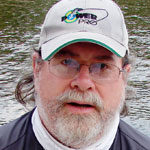
Always make sure you can summon help
Someone once compared heading offshore without proper safety equipment to skydiving without a parachute. If you need the equipment and don’t have it, or it doesn’t work, the odds are good you’ll never need it again. That’s a strong statement, but very appropriate. Help isn’t always nearby in the Gulf Stream, and if no one knows you’re there, if you can’t contact anyone, help isn’t coming.
All of a vessel’s electrical, navigational, communication and safety equipment must be in good working order. Life jackets must be handy, and flares, fire extinguishers and such must not be expired.
Begin by checking the bilge, wash-down and other pumps and that hoses aren’t cracked or broken. Mark Chambers, who runs a 58-foot charter boat out of Morehead City, N.C., but does a fair amount of fishing from a smaller center console, recommends dual bilge pumps. He also recommends having a manual pump “just in case.”
Everyone should have a VHF when going offshore
Capt. Chambers also suggests having dual VHF radios, plus carrying a hand-held VHF. Electronics can develop gremlins in saltwater environments. And the only good time to find out they aren’t working is while sitting on the trailer. He said all offshore fishermen — especially those using smaller boats — should carry an EPIRB (Emergency Position Indicating Radio Beacon) on the boat. The BOATUS Foundation advises PLBs (Personal Locator Beacons) for each person on board. An activated EPIRB will broadcast an SOS and its location to a system of satellites. Those satellites will relay your locale to the U.S. Coast Guard to initiate a search. PLBs are smaller radio beacons that operate similarly. But they have a shorter battery life and must be activated manually. Accuracy of position is within 100 yards, so these really help if a rescue is needed.
EPIRBs are expensive, and fishermen headed offshore only occasionally can rent them from BOATUS (www.boatus.org/epirb).
Fishermen in small boats should always file float plans. And it is wise to buddy up when fishing the ocean — especially 40 miles or so offshore. Accidents happen and things can go from good to bad quickly.
Monitoring the Coast Guard on VHF channel 16 or having it on dual watch is also a good idea. This will provide information about sudden weather changes, navigational situations, searches for missing boats and hearing MayDay calls.


